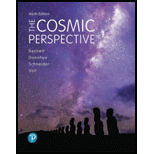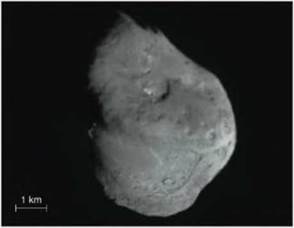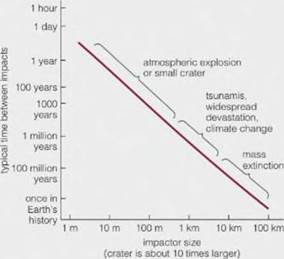
EBK THE COSMIC PERSPECTIVE
9th Edition
ISBN: 9780135161760
Author: Voit
Publisher: VST
expand_more
expand_more
format_list_bulleted
Textbook Question
Chapter 12, Problem 2VSC
Use the following questions to check your understanding of some of the many types of visual information used in astronomy. Rir additional practice, try the Chapter 12 Visual Quiz at MastetingAstninomy*1 2 3.


The graph above I Figure 12.30) shows how often impacts occur for objects of different sizes. The photo above shows Comet Tempel 1 moments before the Deep Impact spacecraft crashed into it.
- Meteor Crater m Arizona is about 1.2 kilometers across. According to the graph, about how big was the object that made this crater? (Note: Be sure to read tine axis labels carefully.)
- I meter
- 10 meters
- 100 meters
- 1 kilometer
- How often do objects big enough Io create craters like Meteor Crater impact Earth?
- once in Earth's history
- about once every ten thousand years
- about once every few million years
- about once every day, but most burn up in the atmosphere or land in the ocean
Expert Solution & Answer
Want to see the full answer?
Check out a sample textbook solution
Students have asked these similar questions
12. If all three collisions in the figure below are
totally inelastic, which will cause more damage?
(think about which collision has a larger amount of
kinetic energy dissipated/lost to the environment?
I
m
II
III
A. I
B. II
C. III
m
m
v
brick wall
ע
ע
0.5v
2v
0.5m
D. I and II
E. II and III
F. I and III
G. I, II and III (all of them)
2m
Can you solve this 2 question teach me step by step and draw for me
From this question and answer can you explain how get (0,0,5) and (5,0,,0) and can you teach me how to solve this
Chapter 12 Solutions
EBK THE COSMIC PERSPECTIVE
Ch. 12 - Prob. 1VSCCh. 12 - Use the following questions to check your...Ch. 12 - Use the following questions to check your...Ch. 12 - Prob. 4VSCCh. 12 - Use the following questions to check your...Ch. 12 - 1. Briefly define asteroid. comet, dwarf planet,...Ch. 12 - Briefly describe asteroid sizes, shapes, masses,...Ch. 12 - 3. Distinguish between primitive meteorites and...Ch. 12 - 4. What do meteorites and spacecraft observations...Ch. 12 - Prob. 5EAP
Ch. 12 - Prob. 6EAPCh. 12 - Prob. 7EAPCh. 12 - How do we know the Kuiper belt and Oort cloud...Ch. 12 - Prob. 9EAPCh. 12 - Prob. 10EAPCh. 12 - Prob. 11EAPCh. 12 - Briefly describe the evidence suggesting that an...Ch. 12 - Prob. 13EAPCh. 12 - Prob. 14EAPCh. 12 - Prob. 15EAPCh. 12 - Prob. 16EAPCh. 12 - Prob. 17EAPCh. 12 - Prob. 18EAPCh. 12 - Prob. 19EAPCh. 12 - Prob. 20EAPCh. 12 - Prob. 21EAPCh. 12 - Prob. 22EAPCh. 12 - Prob. 23EAPCh. 12 - Prob. 24EAPCh. 12 - Choose the best answer to each of the following....Ch. 12 - Choose the best answer to each of the following....Ch. 12 - Choose the best answer to each of the following....Ch. 12 - Choose the best answer to each of the following....Ch. 12 - Choose the best answer to each of the following....Ch. 12 - Choose the best answer to each of the following....Ch. 12 - Choose the best answer to each of the following....Ch. 12 - Choose the best answer to each of the following....Ch. 12 - Choose the best answer to each of the following....Ch. 12 - Choose the best answer to each of the following....Ch. 12 - The Role of Jupiter. Suppose that Jupiter had...Ch. 12 - Prob. 41EAPCh. 12 - Prob. 42EAPCh. 12 - Comet Tails. Describe in your own words why comets...Ch. 12 - Prob. 44EAPCh. 12 - Adding Up Asteroids. It’s estimated that there are...Ch. 12 - Impact Energies. A relatively small impact crater...Ch. 12 - The “Near Miss” of Toutatis. The 5-kilometer...Ch. 12 - Prob. 50EAPCh. 12 - Comet Temperatures. Find the “no greenhouse”...Ch. 12 - Comet Dust Accumulation. A few hundred tons of...
Knowledge Booster
Learn more about
Need a deep-dive on the concept behind this application? Look no further. Learn more about this topic, physics and related others by exploring similar questions and additional content below.Similar questions
- Can you solve this 2 question and teach me using ( engineer method formula)arrow_forward11. If all three collisions in the figure below are totally inelastic, which brings the car of mass (m) on the left to a halt? I m II III m m ע ע ע brick wall 0.5v 2m 2v 0.5m A. I B. II C. III D. I and II E. II and III F. I and III G. I, II and III (all of them)arrow_forwardHow can you tell which vowel is being produced here ( “ee,” “ah,” or “oo”)? Also, how would you be able to tell for the other vowels?arrow_forward
- You want to fabricate a soft microfluidic chip like the one below. How would you go about fabricating this chip knowing that you are targeting a channel with a square cross-sectional profile of 200 μm by 200 μm. What materials and steps would you use and why? Disregard the process to form the inlet and outlet. Square Cross Sectionarrow_forward1. What are the key steps involved in the fabrication of a semiconductor device. 2. You are hired by a chip manufacturing company, and you are asked to prepare a silicon wafer with the pattern below. Describe the process you would use. High Aspect Ratio Trenches Undoped Si Wafer P-doped Si 3. You would like to deposit material within a high aspect ratio trench. What approach would you use and why? 4. A person is setting up a small clean room space to carry out an outreach activity to educate high school students about patterning using photolithography. They obtained a positive photoresist, a used spin coater, a high energy light lamp for exposure and ordered a plastic transparency mask with a pattern on it to reduce cost. Upon trying this set up multiple times they find that the full resist gets developed, and they are unable to transfer the pattern onto the resist. Help them troubleshoot and find out why pattern of transfer has not been successful. 5. You are given a composite…arrow_forwardTwo complex values are z1=8 + 8i, z2=15 + 7 i. z1∗ and z2∗ are the complex conjugate values. Any complex value can be expessed in the form of a+bi=reiθ. Find r and θ for (z1-z∗2)/z1+z2∗. Find r and θ for (z1−z2∗)z1z2∗ Please show all stepsarrow_forward
- An electromagnetic wave is traveling through vacuum in the positive x direction. Its electric field vector is given by E=E0sin(kx−ωt)j^,where j^ is the unit vector in the y direction. If B0 is the amplitude of the magnetic field vector, find the complete expression for the magnetic field vector B→ of the wave. What is the Poynting vector S(x,t), that is, the power per unit area associated with the electromagnetic wave described in the problem introduction? Give your answer in terms of some or all of the variables E0, B0, k, x, ω, t, and μ0. Specify the direction of the Poynting vector using the unit vectors i^, j^, and k^ as appropriate. Please explain all stepsarrow_forwardAnother worker is performing a task with an RWL of only 9 kg and is lifting 18 kg, giving him an LI of 2.0 (high risk). Questions:What is the primary issue according to NIOSH?Name two factors of the RWL that could be improved to reduce risk.If the horizontal distance is reduced from 50 cm to 30 cm, how does the HM change and what effect would it have?arrow_forwardTwo complex values are z1=8 + 8i, z2=15 + 7 i. z1∗ and z2∗ are the complex conjugate values. Any complex value can be expessed in the form of a+bi=reiθ. Find r and θ for z1z2∗. Find r and θ for z1/z2∗? Find r and θ for (z1−z2)∗/z1+z2∗. Find r and θ for (z1−z2)∗/z1z2∗ Please explain all steps, Thank youarrow_forward
- An ac series circuit consists of a voltage source of frequency 60 Hz and voltage amplitude V, a 505-Ω resistor, and a capacitor of capacitance 7.2 μF. What must be the source voltage amplitude V for the average electrical power consumed in the resistor to be 236 W? There is no inductance in the circuit.arrow_forwardAn L−R−C series circuit has R= 280 Ω . At the frequency of the source, the inductor has reactance XLL= 905 Ω and the capacitor has reactance XC= 485 Ω . The amplitude of the voltage across the inductor is 445 V . What is the amplitude of the voltage across the resistor and the capacitor? What is the voltage amplitude of the source? What is the rate at which the source is delivering electrical energy to the circuit?arrow_forwardA 0.185 H inductor is connected in series with a 98.5 Ω resistor and an ac source. The voltage across the inductor is vL=−(12.5V)sin[(476rad/s)t]vL. Derive an expression for the voltage vR across the resistor. Express your answer in terms of the variables L, R, VL (amplitude of the voltage across the inductor), ω, and t. What is vR at 2.13 ms ? Please explain all stepsarrow_forward
arrow_back_ios
SEE MORE QUESTIONS
arrow_forward_ios
Recommended textbooks for you
 Glencoe Physics: Principles and Problems, Student...PhysicsISBN:9780078807213Author:Paul W. ZitzewitzPublisher:Glencoe/McGraw-Hill
Glencoe Physics: Principles and Problems, Student...PhysicsISBN:9780078807213Author:Paul W. ZitzewitzPublisher:Glencoe/McGraw-Hill AstronomyPhysicsISBN:9781938168284Author:Andrew Fraknoi; David Morrison; Sidney C. WolffPublisher:OpenStax
AstronomyPhysicsISBN:9781938168284Author:Andrew Fraknoi; David Morrison; Sidney C. WolffPublisher:OpenStax Foundations of Astronomy (MindTap Course List)PhysicsISBN:9781337399920Author:Michael A. Seeds, Dana BackmanPublisher:Cengage Learning
Foundations of Astronomy (MindTap Course List)PhysicsISBN:9781337399920Author:Michael A. Seeds, Dana BackmanPublisher:Cengage Learning Stars and Galaxies (MindTap Course List)PhysicsISBN:9781337399944Author:Michael A. SeedsPublisher:Cengage Learning
Stars and Galaxies (MindTap Course List)PhysicsISBN:9781337399944Author:Michael A. SeedsPublisher:Cengage Learning Horizons: Exploring the Universe (MindTap Course ...PhysicsISBN:9781305960961Author:Michael A. Seeds, Dana BackmanPublisher:Cengage Learning
Horizons: Exploring the Universe (MindTap Course ...PhysicsISBN:9781305960961Author:Michael A. Seeds, Dana BackmanPublisher:Cengage Learning

Glencoe Physics: Principles and Problems, Student...
Physics
ISBN:9780078807213
Author:Paul W. Zitzewitz
Publisher:Glencoe/McGraw-Hill

Astronomy
Physics
ISBN:9781938168284
Author:Andrew Fraknoi; David Morrison; Sidney C. Wolff
Publisher:OpenStax

Foundations of Astronomy (MindTap Course List)
Physics
ISBN:9781337399920
Author:Michael A. Seeds, Dana Backman
Publisher:Cengage Learning

Stars and Galaxies (MindTap Course List)
Physics
ISBN:9781337399944
Author:Michael A. Seeds
Publisher:Cengage Learning

Horizons: Exploring the Universe (MindTap Course ...
Physics
ISBN:9781305960961
Author:Michael A. Seeds, Dana Backman
Publisher:Cengage Learning

Kepler's Three Laws Explained; Author: PhysicsHigh;https://www.youtube.com/watch?v=kyR6EO_RMKE;License: Standard YouTube License, CC-BY